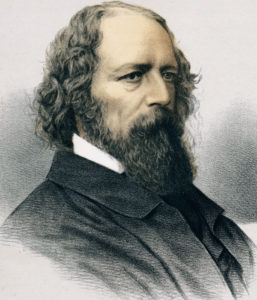 In the 1840s, shortly after publishing his poem “The Vision of Sin,” Alfred Lord Tennyson received a letter from a Cambridge mathematics professor, who had a problem with a couplet in the middle that read:
In the 1840s, shortly after publishing his poem “The Vision of Sin,” Alfred Lord Tennyson received a letter from a Cambridge mathematics professor, who had a problem with a couplet in the middle that read:
“Every minute dies a man,
Every minute one is born.”
“If this were true,” the mathematician wrote, “the population of the world would be at a standstill. In truth, the rate of birth is slightly in excess of that of death.”
Then he suggested Tennyson revise the couplet to read:
“Every moment dies a man
and one and 1/16th is born.”
“The actual figure is so long I cannot get it onto a line, but I believe the figure 1 1/16 will be sufficiently accurate for poetry,” the mathematician wrote.
Reader, the math professor considered the poem’s meter as he composed his feedback.
Sometimes, when we receive feedback from our first readers and fellow writers, their suggestions can seem downright baffling. You want me to obsess about fractions and world population in my poem about mortality and regret? You want me to cut an entire chapter? You want how many more vampires and zombies?
But it is good to remember, even if we will never change “every minute” to “every 1 1/16th,” we should still listen. Most of the time, our critics aren’t pulling those ideas out of thin air. They’re telling us something in our work is off.
“Everything that someone says about your work may not be right, but I say you must pay attention to it,” Toni Morrison said once in an interview. “If I am restless about it, something is wrong. I may not know what it is; what I say is wrong may not be right; but pay attention to my unease, or anybody’s unease.”
Your reader’s unease is one of the most valuable gifts of feedback—it enables us to trace it back to its source, to spot and diagnose a problem, maybe even a fatal one, that might otherwise have gone undetected.
“Editing isn’t just about putting in semicolons, but about engaging with content and ideas,” the English writer Blake Morrison told the Guardian. “It means seeing the blindingly obvious flaws that the author—through vanity or laziness—has missed.”
Of course you’ll want to revise your story in your own way, to achieve your own vision. Listening to feedback doesn’t mean taking every suggestion.
Then again, you’ll take some of them. Tennyson did.
In all subsequent editions of “The Vision of Sin,” that couplet now reads:
“Every moment dies a man,
Every moment one is born.”
Apparently, Tennyson did not want his poem sullied by inaccuracies. Luckily, a well-intentioned reader took the trouble to point one out.

Kelly Caldwell
Dean of Faculty


